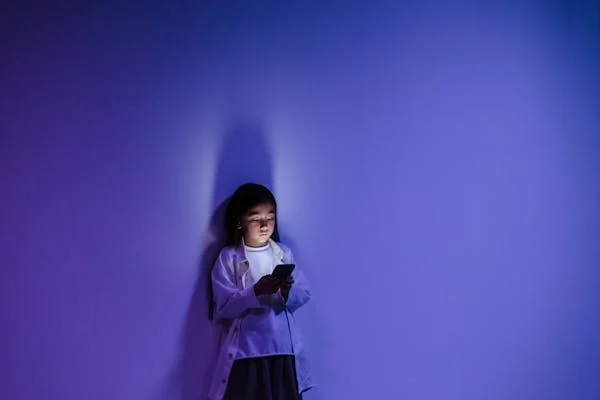
Blue Light and its Impact on Your Vision: Myths Vs. Facts
In today’s digital age, our days are made up of staring at screens for extended periods of time. Be it your smartphone, laptop, or even the television, all these devices emit blue light. With our eyes dealing with hours upon hours of screen time, it's no surprise that there’s increasing concern about the impact of blue light on our eye health.
Unfortunately, with so much information out there, it can be hard to separate fact from fiction. In this blog, we'll bust some common myths about blue light and debunk them with facts that you should know.
Myth #1: Blue Light from Screens Causes Permanent Eye Damage
Fact:
While it’s true that blue light contributes to digital eye strain, there is currently no scientific evidence to support the claim that blue light from screens causes permanent damage to the eyes.
The primary concern with blue light exposure is that it can cause temporary discomfort, such as headaches, dry eyes, and fatigue, especially after extended screen time. However, proper eye care habits can alleviate these symptoms and prevent further discomfort.
Myth #2: Blue Light Only Comes from Screens
Fact:
We all know that blue light is emitted by screens, but natural sunlight is actually the largest source of blue light. Sunlight contains a full spectrum of light, including blue light, which regulates our sleep-wake cycle and boosts our mood. Indoor lighting, like LED bulbs, also emits a significant amount of blue light.
However, screens tend to expose us to blue light in a more concentrated form as we use them for extended periods.
Myth #3: Blue Light Causes Insomnia
Fact:
There is some truth to this claim. Blue light does interfere with the production of melatonin, a hormone that helps regulate our sleep patterns. Blue light exposure, especially in the evening, can delay feeling sleepy and make it harder to fall asleep. However, research hasn't found enough evidence to directly lay the claim that blue light causes insomnia.
Stress, poor sleep hygiene, and diet can also contribute to sleeplessness. If you want to improve your sleep, reducing screen time before bed and enabling night mode or using blue light-blocking glasses is recommended.
Myth #4: Blue Light Only Affects Your Eyes, Not Your Overall Health
Fact:
Prolonged exposure to blue light can impact more than just your eye health. By interfering with melatonin production, it can disrupt your sleep cycle and have a domino effect on your overall health, leading to reduced energy levels, poor focus, and even mood changes. You can enhance your overall well-being and improve your sleep quality by reducing exposure to blue light.
Myth #5: Blue Light-Blocking Glasses Are a Miracle Solution
Fact:
While blue light-blocking glasses can reduce the amount of blue light that reaches your eyes, they are not an "ultimate solution." These glasses may help alleviate digital eye strain and make screen time more comfortable, but they won't be as effective on their own.
Combining blue light-blocking glasses with healthy habits like taking regular breaks, adjusting screen settings, and practicing good posture is essential to get the best results.
How to Protect Your Eyes from Blue Light
While the myths surrounding blue light may be misleading, there are several effective ways to protect your eye health:
1. Use Blue Light Filters
Many devices have built-in blue light filters or night mode features. These can reduce your blue light exposure, especially after dark.
2. Adjust Screen Settings
Modify the brightness and contrast on your devices to match the lighting in your surroundings. Avoid using screens in a completely dark room.
3. Take Regular Breaks
Follow the 20-20-20 rule to reduce digital eye strain: every 20 minutes, look at something 20 feet away for 20 seconds.
4. Use Blue Light-Blocking Glasses
If you spend long hours in front of screens, consider wearing blue light-blocking glasses to reduce discomfort.
5. Improve Sleep Hygiene
Avoid screen time an hour before bed to reduce blue light exposure and help your body produce more melatonin, which is essential for good sleep.
Conclusion
There are many myths about blue light, but the facts are clear. While blue light can cause eye strain and disrupt sleep patterns, there is no evidence suggesting that it causes permanent eye damage.
Additionally, incorporating regular breaks from screens, adjusting your device’s brightness, and using blue light-blocking glasses can further help reduce discomfort and improve your overall well-being. Prioritize your eye health to maintain a healthy digital lifestyle.
By following a few simple steps, such as reducing screen time, using blue light filters, and getting adequate sleep, you can protect your eyes and improve your overall health. It’s all about balance and being proactive in managing your digital habits. Here's to healthy living!
